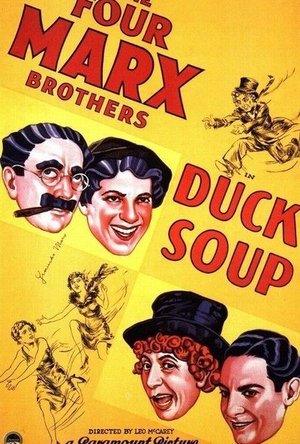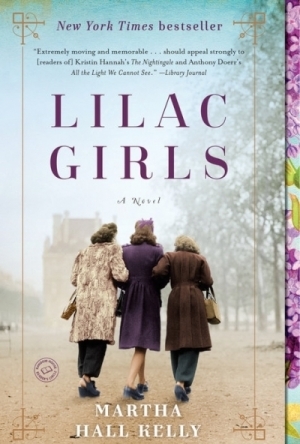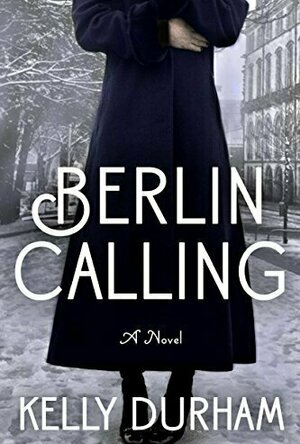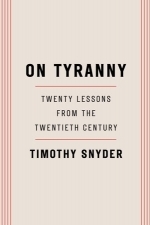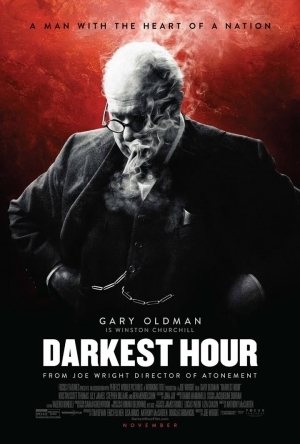Search
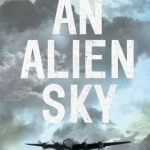
An Alien Sky: The Story of One Man's Remarkable Adventure in Bomber Command During the Second World War
Book
By any measure, Andy Wiseman (born Weizman) is a lucky man. The only son of a Polish father and an...
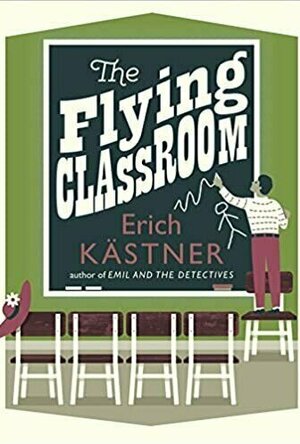
The Flying Classroom
Book
A Spectator, Guardian, <Times, Independent on Sunday, Lovereading4kids and Mumsnet Book of the Year ...
RəX Regent (349 KP) rated Duck Soup (1933) in Movies
Feb 18, 2019
“You’re a brave man. Go and break through the lines. And remember, while you’re out there risking your life and limb through shot and shell, we’ll be in be in here thinking what a sucker you are” Rufus T. Firefly
And the one liners just keep on coming…
Here we have before you one of the most famous entries form The Marx Brothers as they made their indelible mark on Hollywood(land) and the silver screen back in the 1930’s, moving away from their Vaudeville roots to new level of immortally on celluloid.
The fifth film to credit the “The Marx Brothers”, Duck Soup in on one hand a sharply written satire on the weakness of mob mentality to willingly promote unwelcome change to their society and their willingness to follow just about any lunatic as long as they like what they hear; as well as a straight forward slapstick comedy of the time, in keeping with its music hall roots.
It is the music hall aspect of this classic which can be harder for a modern audience to take to, unless you are already disposed to this sort of rather dated humour. But as a satire, it is brilliant and still very funny over seventy years on.
Groucho Marx steals the show as Rufus T. Firefly as he leads his unwitting and possibly dimwitted fictional country of Fredonia (geddit?) to war and ultimate destruction. He is a character, whilst not in any way taking off Adolf Hitler, who was of course rising to power in Germany at this very moment, was clearly a reflection on this type of reckless and charismatic leader and as the hilarious final act demonstrates, is all too common in history and even in our present.
And the fact that Fredonia is ultimately doomed, was a coincidental foreshadowing of Nazi Germany’s fate a decade later, as well as a clear demonstration of the savvy writing.
Witty, whether it is the physical trademark Marx Brothers comedy or the sharp screenplay by Bert Kalmar and Harry Ruby, based on the stage version of the same name, this a classic satire; whilst not being as hard hitting a s Chaplin’s works of the period, with The Great Dictator (1940) springing to mind, it still holds up and makes its point without hammering you over the head it.
So, you can just enjoy the show and/or take away the message, it is really up to you.
Here we have before you one of the most famous entries form The Marx Brothers as they made their indelible mark on Hollywood(land) and the silver screen back in the 1930’s, moving away from their Vaudeville roots to new level of immortally on celluloid.
The fifth film to credit the “The Marx Brothers”, Duck Soup in on one hand a sharply written satire on the weakness of mob mentality to willingly promote unwelcome change to their society and their willingness to follow just about any lunatic as long as they like what they hear; as well as a straight forward slapstick comedy of the time, in keeping with its music hall roots.
It is the music hall aspect of this classic which can be harder for a modern audience to take to, unless you are already disposed to this sort of rather dated humour. But as a satire, it is brilliant and still very funny over seventy years on.
Groucho Marx steals the show as Rufus T. Firefly as he leads his unwitting and possibly dimwitted fictional country of Fredonia (geddit?) to war and ultimate destruction. He is a character, whilst not in any way taking off Adolf Hitler, who was of course rising to power in Germany at this very moment, was clearly a reflection on this type of reckless and charismatic leader and as the hilarious final act demonstrates, is all too common in history and even in our present.
And the fact that Fredonia is ultimately doomed, was a coincidental foreshadowing of Nazi Germany’s fate a decade later, as well as a clear demonstration of the savvy writing.
Witty, whether it is the physical trademark Marx Brothers comedy or the sharp screenplay by Bert Kalmar and Harry Ruby, based on the stage version of the same name, this a classic satire; whilst not being as hard hitting a s Chaplin’s works of the period, with The Great Dictator (1940) springing to mind, it still holds up and makes its point without hammering you over the head it.
So, you can just enjoy the show and/or take away the message, it is really up to you.
Nicole Hadley (380 KP) rated The Sound of Freedom in Books
Jun 18, 2018
The Sound of Freedom by Kathy Kacer is a middle-grade novel about a Jewish family in Krakow, Poland in 1936. Life has become increasingly dangerous, as the violence and persecution of Jews increase. Anna is afraid if they don’t escape soon, something really bad will happen. Her father is a talented clarinetist in the Krakow Philharmonic Orchestra. They hear that Bronislaw Huberman is auditioning Jewish musicians from all over Europe for a new orchestra in Palestine. If her father auditions and is accepted, she and her grandmother can leave Poland with her father for a new life in Palestine.
Stories of Jews in the Holocaust have fascinated me since I was a kid. The first book about the Holocaust I read was Number the Stars by Lois Lowry, then later A Diary of Anne Frank, and many more. My interest in the Holocaust is why I requested a copy of this book from NetGalley.
The Sound of Freedom is an introduction to the beginning of the Holocaust for middle-grade students. The story is told through the eyes of Anna, focusing on the growing anti-Semitism she sees going on around her and that eventually happens to her. It is set in 1936, before Germany’s invasion of Poland and as Hitler is rising in power, so the real horrors of the Holocaust have not yet started.
While the story of Anna’s family is fiction, Bronislaw Huberman really was a world-renown violinist and did create the Palestine Philharmonic Orchestra to save over a thousand Jews by recruiting them for the newly formed orchestra. Anna’s story is representative of the lives saved by Bronislaw Huberman.
While the story is for middle-grade student, it tells the harsh reality of the what was happening. Readers will be faced with the problems and issues of the era. Some of the families leave the orchestra to go back to their homeland, and Anna is concerned for their safety and the reader is left to wonder what happened to them. The story also mentions the tensions between the Arabs and the Jewish peoples in Palestine. Anna's family may have escaped Poland, but they are faced with issues in Palestine.
I give the story 4.5 stars. I recommend it to anyone with an interest in the time-period. The Sound of Freedom would make an excellent addition to a Holocaust study.
I received an Advanced Readers Copy from Annick Press via NetGalley in exchange for an honest review.
Stories of Jews in the Holocaust have fascinated me since I was a kid. The first book about the Holocaust I read was Number the Stars by Lois Lowry, then later A Diary of Anne Frank, and many more. My interest in the Holocaust is why I requested a copy of this book from NetGalley.
The Sound of Freedom is an introduction to the beginning of the Holocaust for middle-grade students. The story is told through the eyes of Anna, focusing on the growing anti-Semitism she sees going on around her and that eventually happens to her. It is set in 1936, before Germany’s invasion of Poland and as Hitler is rising in power, so the real horrors of the Holocaust have not yet started.
While the story of Anna’s family is fiction, Bronislaw Huberman really was a world-renown violinist and did create the Palestine Philharmonic Orchestra to save over a thousand Jews by recruiting them for the newly formed orchestra. Anna’s story is representative of the lives saved by Bronislaw Huberman.
While the story is for middle-grade student, it tells the harsh reality of the what was happening. Readers will be faced with the problems and issues of the era. Some of the families leave the orchestra to go back to their homeland, and Anna is concerned for their safety and the reader is left to wonder what happened to them. The story also mentions the tensions between the Arabs and the Jewish peoples in Palestine. Anna's family may have escaped Poland, but they are faced with issues in Palestine.
I give the story 4.5 stars. I recommend it to anyone with an interest in the time-period. The Sound of Freedom would make an excellent addition to a Holocaust study.
I received an Advanced Readers Copy from Annick Press via NetGalley in exchange for an honest review.
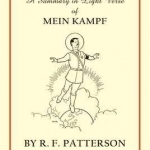
Mein Rant - A Summary in Light Verse of 'Mein Kampf'
R.F. Patterson and Heath Robinson
Book
R F Paterson was a great fan of Gilbert and Sullivan, and when Germany invaded Poland on 1st...
The Chocolate Lady (94 KP) rated Lilac Girls in Books
Oct 5, 2020
This novel is very nicely written, with interesting characters. In particular, the protagonist Caroline is beautifully formed, with a life that is fascinating for those who know little about how Americans tried to help those who became unwitting refugees in the US after Hitler invaded their homelands. However, we must remember that Holocaust novels are a dime a dozen. This is why I was hoping that this novel would be different, particularly since the blurb for this book talks about Christine and her helping two survivors of the women's camp Ravensbruck. Unfortunately, the detailed information about the two other women in this story, and their introduction to Ravensbruck was, in my opinion, too much back-story. Although retelling the grim and gory ways that the Nazis treated their prisoners is a necessary evil, I somehow felt that this book included these scenes only to evoke pity for these characters. I don't want to pity characters, I want to have empathy for them, to care about them, and the author let me down with this.
In addition - and I hope this doesn't sound racist or snobbish - as a Jew, I have a hard time with Holocaust novels that seem to outwardly ignore how the Nazis treated the Jews, and only focuses on the other "undesirables." I realize that the Nazis didn't only kill Jews, but they were their primary target, and to avoid that altogether was disingenuous, to say the least. However, I was glad that this book didn't focus on any overtly Christian themes, even though I believe that there is a market for Holocaust stories within the Christian Fiction genre (see my review of the novel The Butterfly and the Violin by Kristy Cambron here http://drchazan.blogspot.com/2014/07/beauty-out-of-ugliness.html for more on my feelings about this).
Furthermore, the only Jewish reference I found in this novel was a passing reference to visiting the Ghetto and a remembrance of eating a Hanukkah delicacy. Unfortunately, the author didn't do her research properly, and the character said she remembered eating a type of doughnut that the Jewish bakers made for the holiday. Those doughnuts - known as "sufganiot" were never part of any Eastern European Hanukkah celebration at that time. In fact, sufganiot that are popular among Jews today, come from the Jews of North Africa and Arab countries. The word, sufganiot, comes from the Arabic and Hebrew words that mean sponge. While Jews in Poland did make something similar, their popularity as a particularly Hanukkah delicacy among Easter European Jews only coincided after Ashkenazi and Mizrahi Jews came together in Israel (i.e., post-1948). All of this is why I cannot give this book a rating of more than two and a half stars out of five, but I'm certain that it will find a much more sympathetic audience among non-Jewish readers.
In addition - and I hope this doesn't sound racist or snobbish - as a Jew, I have a hard time with Holocaust novels that seem to outwardly ignore how the Nazis treated the Jews, and only focuses on the other "undesirables." I realize that the Nazis didn't only kill Jews, but they were their primary target, and to avoid that altogether was disingenuous, to say the least. However, I was glad that this book didn't focus on any overtly Christian themes, even though I believe that there is a market for Holocaust stories within the Christian Fiction genre (see my review of the novel The Butterfly and the Violin by Kristy Cambron here http://drchazan.blogspot.com/2014/07/beauty-out-of-ugliness.html for more on my feelings about this).
Furthermore, the only Jewish reference I found in this novel was a passing reference to visiting the Ghetto and a remembrance of eating a Hanukkah delicacy. Unfortunately, the author didn't do her research properly, and the character said she remembered eating a type of doughnut that the Jewish bakers made for the holiday. Those doughnuts - known as "sufganiot" were never part of any Eastern European Hanukkah celebration at that time. In fact, sufganiot that are popular among Jews today, come from the Jews of North Africa and Arab countries. The word, sufganiot, comes from the Arabic and Hebrew words that mean sponge. While Jews in Poland did make something similar, their popularity as a particularly Hanukkah delicacy among Easter European Jews only coincided after Ashkenazi and Mizrahi Jews came together in Israel (i.e., post-1948). All of this is why I cannot give this book a rating of more than two and a half stars out of five, but I'm certain that it will find a much more sympathetic audience among non-Jewish readers.
Sophia (Bookwyrming Thoughts) (530 KP) rated Hidden Gold: A True Story of the Holocaust in Books
Jan 23, 2020
<b><i>I received this book for free from Publisher in exchange for an honest review. This does not affect my opinion of the book or the content of my review.</i></b>
I'm generally not a memoir person. But if I'm going to read a memoir (or even nonfiction), I'll choose anything about the Holocaust (I find that time period sadistically interesting).
<i>Hidden Gold</i> deserves about as much praise as Anne Frank's <i>Diary of a Young Girl</i>. A story set in another part of Europe (Poland) during Hitler's reign, Burakowski tells us her family's survival, hidden away from society in the hopes that they won't be found out.
For two years, the Golds hid with the Lanskis in a small part of a barn in Kolkow, surviving with very little sustenance. During that time, their hope dwindles little by little, but the two families still cling on to their pasts, even if that life will be impossible to get back to after everything blows over.
I loved how Burakowski introduces us to her family and the people that the Golds were involved with, giving us lots of background information on how Leib met Hanna and how the Golds lived their life in the early parts of the war. Burakowski also gives us insight on the growing hypocrisy and horrors among society as Hitler's power and anti-Semitism grew, giving us visuals on how life was like for the Jews back in the late 1930s and early 1940s. We're also shown the inner turmoils going on with those who had good relations with Jews and now having to choose whether or not they should help Jews, or give in to the propaganda.
Shoshana, Hanna's daughter, is extremely admirable. She's willing to go out to the Germans, pretending to be one of them, to buy her family time. She is also willing to risk her life a few times to get her family's money from Pi?czów, and going back again <em>while</em> she felt ill. If I were in her place, I'd probably continue to curl up in a fetal little ball. (Despite the fact I'm considered living in "poverty," I'm pretty much a lucky duckling. Also, being an only child, I'm probably a <em>little</em> spoiled.)
David is perhaps one of those where all the feels will come. Like any little kid, he's full of mischief and mayhem, but going through such a dark time at a really young age, he's extremely brave, confident, and has the most hope for the family getting out alive.
Although most of <i>Hidden Gold</i> is focused on the Gold's survival during Hitler running rampant with the final solution, Burakowski finalizes the story from David's viewpoint with how each of the family members were impacted years later in the future. For those interested in what happened in other parts of Europe or a survival story outside of concentration camps, Ella Burakowski's <i>Hidden Gold</i> makes a fantastic contribution depicting the horrors of the Holocaust.
<a href="https://bookwyrmingthoughts.com/arc-review-hidden-gold-by-ella-burakowski/"; target="_blank">This review was originally posted on Bookwyrming Thoughts</a>
I'm generally not a memoir person. But if I'm going to read a memoir (or even nonfiction), I'll choose anything about the Holocaust (I find that time period sadistically interesting).
<i>Hidden Gold</i> deserves about as much praise as Anne Frank's <i>Diary of a Young Girl</i>. A story set in another part of Europe (Poland) during Hitler's reign, Burakowski tells us her family's survival, hidden away from society in the hopes that they won't be found out.
For two years, the Golds hid with the Lanskis in a small part of a barn in Kolkow, surviving with very little sustenance. During that time, their hope dwindles little by little, but the two families still cling on to their pasts, even if that life will be impossible to get back to after everything blows over.
I loved how Burakowski introduces us to her family and the people that the Golds were involved with, giving us lots of background information on how Leib met Hanna and how the Golds lived their life in the early parts of the war. Burakowski also gives us insight on the growing hypocrisy and horrors among society as Hitler's power and anti-Semitism grew, giving us visuals on how life was like for the Jews back in the late 1930s and early 1940s. We're also shown the inner turmoils going on with those who had good relations with Jews and now having to choose whether or not they should help Jews, or give in to the propaganda.
Shoshana, Hanna's daughter, is extremely admirable. She's willing to go out to the Germans, pretending to be one of them, to buy her family time. She is also willing to risk her life a few times to get her family's money from Pi?czów, and going back again <em>while</em> she felt ill. If I were in her place, I'd probably continue to curl up in a fetal little ball. (Despite the fact I'm considered living in "poverty," I'm pretty much a lucky duckling. Also, being an only child, I'm probably a <em>little</em> spoiled.)
David is perhaps one of those where all the feels will come. Like any little kid, he's full of mischief and mayhem, but going through such a dark time at a really young age, he's extremely brave, confident, and has the most hope for the family getting out alive.
Although most of <i>Hidden Gold</i> is focused on the Gold's survival during Hitler running rampant with the final solution, Burakowski finalizes the story from David's viewpoint with how each of the family members were impacted years later in the future. For those interested in what happened in other parts of Europe or a survival story outside of concentration camps, Ella Burakowski's <i>Hidden Gold</i> makes a fantastic contribution depicting the horrors of the Holocaust.
<a href="https://bookwyrmingthoughts.com/arc-review-hidden-gold-by-ella-burakowski/"; target="_blank">This review was originally posted on Bookwyrming Thoughts</a>
BookInspector (124 KP) rated Berlin Calling in Books
Sep 24, 2020
I am quite a bit of a fan, when it comes to books about World War II, add women in it, and I’m intrigued. That was what drew me to this book, a woman figure in the context of war and not just woman, a foreigner. The description above, describes this novel quite well. It started with very romantic notes, how Maggie met Kurt, and how she ended up in Berlin, landing a job in Propaganda House. Maggie is very interesting character in this book, and I really loved her in this novel. She is beautiful, pleasant to be around, incredibly hard working and independent. I’m kind of used to these disturbed characters which are used in most of the books, and it was very refreshing to read about one, who is not mentally or emotionally messed up. Other characters were interesting to read about as well, and all of them where quite the personalities. I really enjoyed, that author did not make this book from one characters perspective, and included most of the characters by allowing them to speak. This made the book more pleasant to read, and more interesting.
The plot of this book was really absorbing, and different from most of the WWII books I read. Normally, I encountered the books, which used to describe the tragedy of war, such as concentration camps or Jew’s killings, and their fighting for survival. This book was softer on that part, it mentioned the cruelties’ which happened during the war, but never in so much detail to make it stomach turning. It was written more about the political aspects of it, and how German propaganda was used to influence people from other countries. It’s been a while since I studied history of WWII, and I studied from different countries’ perspective, so to see how it looked from Germany's perspective was quite appealing. I think that author was trying to show, how Germans thought about this war and why most of them supported what Hitler was doing.
I am a big fan of short chapters, and this book didn’t disappoint me with that. The chapters were divided into smaller parts, which made it more pleasant to read. Every chapter was quite detailed, but the meaning and the point of that chapter was very lovely opened, and concluded for the reader. The story was flowing nicely and smoothly. I believe Author has a great personal knowledge about war, and used it greatly in this book. There was a little bit of monotony while reading this book, and lack of twists and turns, that would’ve make it more exciting. The language used was not difficult and easy to read, but I had to look up some German terms used in this book, as I’m not familiar with the language. The ending of the book was really entertaining but not complete. I wished more conclusions, and to know what happened to Dieter. To conclude, it is a great book if you looking for World War II stories of war from German perspective, love, and survival.
The plot of this book was really absorbing, and different from most of the WWII books I read. Normally, I encountered the books, which used to describe the tragedy of war, such as concentration camps or Jew’s killings, and their fighting for survival. This book was softer on that part, it mentioned the cruelties’ which happened during the war, but never in so much detail to make it stomach turning. It was written more about the political aspects of it, and how German propaganda was used to influence people from other countries. It’s been a while since I studied history of WWII, and I studied from different countries’ perspective, so to see how it looked from Germany's perspective was quite appealing. I think that author was trying to show, how Germans thought about this war and why most of them supported what Hitler was doing.
I am a big fan of short chapters, and this book didn’t disappoint me with that. The chapters were divided into smaller parts, which made it more pleasant to read. Every chapter was quite detailed, but the meaning and the point of that chapter was very lovely opened, and concluded for the reader. The story was flowing nicely and smoothly. I believe Author has a great personal knowledge about war, and used it greatly in this book. There was a little bit of monotony while reading this book, and lack of twists and turns, that would’ve make it more exciting. The language used was not difficult and easy to read, but I had to look up some German terms used in this book, as I’m not familiar with the language. The ending of the book was really entertaining but not complete. I wished more conclusions, and to know what happened to Dieter. To conclude, it is a great book if you looking for World War II stories of war from German perspective, love, and survival.
Goddess in the Stacks (553 KP) rated On Tyranny: Twenty Lessons From The Twentieth Century in Books
Jan 11, 2018
An excellent book full of warnings
On Tyranny is a short little book. I don't think it needs to be longer - it's easy to read, succinct, and is meant to serve as a warning. If anyone wants to learn more about any of the twenty lessons, there are plenty of resources for that. It's simply "HEY. This happened before. And this happened before. And this happened before and YOU NEED TO SEE THESE SIMILARITIES." It was a very quick read, but has left me with a lot to think about.
The format is simple: Twenty sections, each beginning with a lesson title and a short summary paragraph, then going into more detail in the next two to three pages. For example:
Do Not Obey In Advance.
Most of the power of authoritarianism is freely given. In times like these, individuals think ahead about what a more repressive government will want, and then offer themselves without being asked. A citizen who adapts in this way is teaching power what it can do.
The next few pages talk about Austrian Nazis rounded up Jews and used them as forced labor, before the German government told them to. When Jewish businesses were marked as such, people immediately started avoiding them. Anticipatory obedience. (Relate this to the suddenly overt racism and Nazi marches we're now facing in the US - where that used to be hidden.)
Another example:
Take Responsibility For The Face Of The World.
The symbols of today enable the reality of tomorrow. Notice the swastikas and the other signs of hate. Do not look away, and do not get used to them. Remove them yourself and set an example for others to do so.
The next pages talk about propaganda, and signs. If we tolerate swastikas, we imply that we accept them. That we support them. And if the oppressed groups that those swastikas are aimed at see everyone around them supporting them, who do they look to for help? All it takes is one person deciding to scrub off or paint over the swastika, for people around them to realize that's a thing that can be done. This plays into another section, which talked about Standing Out. Do the thing that makes you stand out - whether that's standing up for a minority, or scrubbing swastikas off walls, or attending a protest. If you don't stand out, you're too easily ignored as part of the problem.
This book had lots of holds at my local library - while I was sad to have to wait so long, I was pleased that so many people wanted to read it. I was 35th in line at one point! Just knowing that so many people want to read it is a little reassuring. The author has written several books on the Holocaust, WWII, and the rise of Hitler, so he knows what he's talking about, and it shows in his writing.
On Tyranny is a quick read and does an amazing job of boiling a lot of complicated concepts down into very succinct little points. I definitely recommend it as a jumping off point. Just don't let it be all you read.
You can find all my reviews at http://goddessinthestacks.wordpress.com
The format is simple: Twenty sections, each beginning with a lesson title and a short summary paragraph, then going into more detail in the next two to three pages. For example:
Do Not Obey In Advance.
Most of the power of authoritarianism is freely given. In times like these, individuals think ahead about what a more repressive government will want, and then offer themselves without being asked. A citizen who adapts in this way is teaching power what it can do.
The next few pages talk about Austrian Nazis rounded up Jews and used them as forced labor, before the German government told them to. When Jewish businesses were marked as such, people immediately started avoiding them. Anticipatory obedience. (Relate this to the suddenly overt racism and Nazi marches we're now facing in the US - where that used to be hidden.)
Another example:
Take Responsibility For The Face Of The World.
The symbols of today enable the reality of tomorrow. Notice the swastikas and the other signs of hate. Do not look away, and do not get used to them. Remove them yourself and set an example for others to do so.
The next pages talk about propaganda, and signs. If we tolerate swastikas, we imply that we accept them. That we support them. And if the oppressed groups that those swastikas are aimed at see everyone around them supporting them, who do they look to for help? All it takes is one person deciding to scrub off or paint over the swastika, for people around them to realize that's a thing that can be done. This plays into another section, which talked about Standing Out. Do the thing that makes you stand out - whether that's standing up for a minority, or scrubbing swastikas off walls, or attending a protest. If you don't stand out, you're too easily ignored as part of the problem.
This book had lots of holds at my local library - while I was sad to have to wait so long, I was pleased that so many people wanted to read it. I was 35th in line at one point! Just knowing that so many people want to read it is a little reassuring. The author has written several books on the Holocaust, WWII, and the rise of Hitler, so he knows what he's talking about, and it shows in his writing.
On Tyranny is a quick read and does an amazing job of boiling a lot of complicated concepts down into very succinct little points. I definitely recommend it as a jumping off point. Just don't let it be all you read.
You can find all my reviews at http://goddessinthestacks.wordpress.com
Gareth von Kallenbach (980 KP) rated Darkest Hour (2017) in Movies
Jul 11, 2019
As the Nazi’s sweep through Europe at the beginning of World War II the British face the difficult issue of replacing their Prime Minister. The people and members of Parliament have become disenchanted with Prime Minister Neville Chamberlain (Ronald Pickup). They feel his lack of action lead to the rise of Hitler and the Nazis. He agrees to step down and has to name a replacement. While he would prefer to have his protégé, Foreign Secretary Viscount Halifax (Stephen Dillane), there is only one member of his party that all of Parliament will accept, Winston Churchill (Gary Oldman). King George VI (Ben Mendelsohn) is also opposed to the brash and opinionated Churchill. Bowing to the will of the opposition Churchill the King agrees to appoint him the next Prime Minister. Although he is thrilled at finally achieving his lifelong dream he has no delusions that he is facing extremely difficult times ahead. The Nazis are tearing through Europe. They have already taken Belgium and Holland they now are invading France. The Nazis have also managed to surround nearly the entire British ground force on the French beaches with no way home. Not only does he have to worry about foreign foes but also his numerous political enemies in his own party. Many oppose his brash and unpredictable nature, while others think of him as heavy drinker that is no more than an exceptional orator with little capacity to make hard decisions. He must overcome all of this to protect the English people and prepare them for the tough days ahead.
Winston Churchill is a very well know historically figure. He was known for his powerful speeches and bigger than life personality. This film takes a look at the early days of him being Prime Minister, during some of the most volatile days in the history of Europe. Not only does the story delve into the politics and struggles of Churchill to put forth his agenda in a hostile climate but also shows him at his most vulnerable. One example is after delivering his first radio address to the nation he walks home alone and to talk with and be reassured by his wife, Clementine Churchill (Kristin Scott Thomas), that his speech was good and people could hear him.
Gary Oldman is spectacular in his role as Chruchill. From the iconic speeches to the light moments with his family and personal secretary, Elizabeth Layton (Lily James), he puts forth a great performance. The supporting cast is great as well, highlighted by Mendelsohn, Scott Thomas and James. The flow of the film really worked, under direction of Joe Wright (Atonement, The Soloist, and Pan). The two hour and five minute run time felt shorter and the movie really moved along. There were some points that they showed some battle scenes, after all it is a World War II era film, which did feel like afterthoughts and didn’t really add anything to the movie. The tension of the moment was well done even without these scenes. Besides those scenes the movie was shot well and added to the overall feel of the movie.
This film will appeal to those who are fans of history, the World War II era specifically, and historical figures. It also is powerful and heartfelt. Really the performances of the cast are what really stuck with me and will be the reason that I watch it again.
Winston Churchill is a very well know historically figure. He was known for his powerful speeches and bigger than life personality. This film takes a look at the early days of him being Prime Minister, during some of the most volatile days in the history of Europe. Not only does the story delve into the politics and struggles of Churchill to put forth his agenda in a hostile climate but also shows him at his most vulnerable. One example is after delivering his first radio address to the nation he walks home alone and to talk with and be reassured by his wife, Clementine Churchill (Kristin Scott Thomas), that his speech was good and people could hear him.
Gary Oldman is spectacular in his role as Chruchill. From the iconic speeches to the light moments with his family and personal secretary, Elizabeth Layton (Lily James), he puts forth a great performance. The supporting cast is great as well, highlighted by Mendelsohn, Scott Thomas and James. The flow of the film really worked, under direction of Joe Wright (Atonement, The Soloist, and Pan). The two hour and five minute run time felt shorter and the movie really moved along. There were some points that they showed some battle scenes, after all it is a World War II era film, which did feel like afterthoughts and didn’t really add anything to the movie. The tension of the moment was well done even without these scenes. Besides those scenes the movie was shot well and added to the overall feel of the movie.
This film will appeal to those who are fans of history, the World War II era specifically, and historical figures. It also is powerful and heartfelt. Really the performances of the cast are what really stuck with me and will be the reason that I watch it again.
